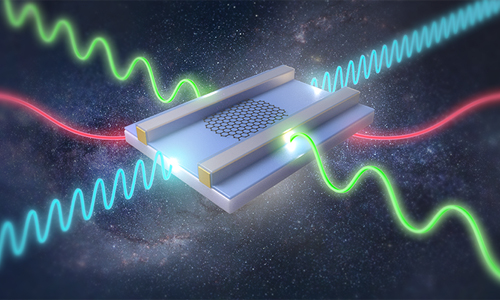|
|
|
|
| |
Welcome to the September edition of
µChicago, which brings the top science stories from across the University
right to your inbox. This month, read about a new type of sensor for detecting water
contaminants, research quantifying under-studied health disparities, and the latest
in lifesaving genetic disease treatment. |
|
| |
|
|
|
|
|
|
|
| |
|
|
|
|
|
|
Image:
Artistic rendering of the water sensor, with graphene-based
nanolayer and two electrodes attached at top. Alternating current
voltages at varying frequencies (wavy lines) are used to rapidly
screen the sensors for quality issues. (Argonne National Laboratory)
|
|
|
|
|
|
|
|
| |
|
|
|
| |
A new design
for water sensors can detect multiple contaminants with its multilayered system,
simultaneously catching mercury, lead, and E. coli in drinking water.
Developed through collaborative research by scientists at Argonne National
Laboratory and the Pritzker School of Molecular Engineering, the sensors’
versatility and reliability are promising advances toward improving public health
outcomes. Read
more. |
|
| |
|
|
|
|
|
|
|
| |
|
|
|
| Sickle cell solutions:
A new approach to
gene
therapy for
sickle cell disease uses CRISPR technology to edit
unhealthy blood cells and transfuse them back into
patients, potentially replacing dangerous and
difficult bone marrow transplants. |
|
|
|
| |
|
|
|
|
|
| |
|
|
|
|
Treating the root: A type of molecule released by
stem cells shows promise in
lowering gene
activity that
causes the hormone imbalances behind polycystic
ovary syndrome—and may help doctors restore
reproductive function in patients with the disorder.
|
|
|
|
| |
|
|
|
|
|
|
|
|
|
| |
Quantifying transgenerational health disparities |
|
| |
|
|
|
|
|
| |
|
|
|
|
|
|
Image: An
estimated 1.8 million people are currently incarcerated in US
prisons or jails, with another 3.9 million on probation or parole.
Roughly 55–63 percent of incarcerated individuals are parents of
children under 18. (UChicago Medicine website) |
|
|
|
|
|
|
|
| |
|
|
|
| |
Incarceration of a parent before a child
reaches the age of 18 can substantially increase the child’s risk of developing
hypertension and coronary disease biomarkers by young adulthood, according to
a study from UChicago
Medicine. Adverse childhood experiences (ACEs)—such
as a parent’s incarceration—are associated with lasting effects on physical and
psychological health. The results of the study prompt further analysis of “how
racial disparities in incarceration may be contributing to health disparities,”
according to lead author Elizabeth Tung, SM’17, assistant professor at UChicago
Medicine. |
|
| |
|
|
|
|
|
|
|
|
|
|
|
| |
| |
|
|
|
|
There’s
something in the
water:
Researchers
are fueling carbon-free
technology with
resources found in water
and a geophysical
scientist explains this
summer’s historic
weather.
|
|
|
|
|
|
|
|
Crisis
and
opportunity:
Read
about
UChicago
Medicine
researchers
working
to solve
human
health
challenges
caused
by the
climate
crisis.
|
|
|
|
|
|
|
|
|
| |
|
|
|
|
|
| |
|
|
Visit the Alumni
& Friends website for
stories, podcasts, and other features, curated for you on UChicago
Review. Create an account for a more
personalized experience. |
|
|
|
| |
|
|
|
|
| |
|
|
Sign up to receive
µChicago monthly. |
|
|
|
| |
|
|
|
|





